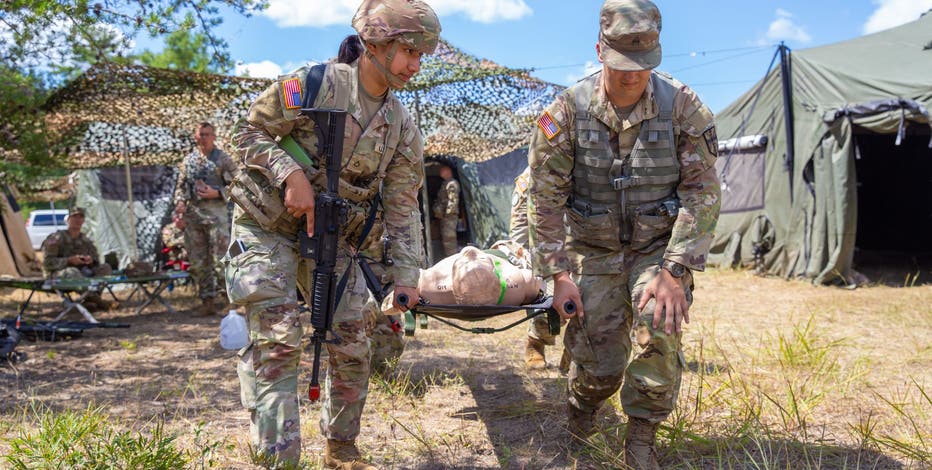This browser does not support the Video element.
Northern Strike '24 brings battlefield training to upper Michigan
Service members from around the country and the world have spent the past two weeks at Michigan’s National All-Domain Warfighting Center (NADWC), which encompasses both Camp Grayling and the Alpena Combat Readiness Training Center.
GRAYLING, Mich. (FOX 2) - From the hum of Blackhawk helicopters, to the blast of howitzers, and the roar of fighter jets, northern Michigan is alive with the sounds of military operations.
Service members from around the country and the world have spent the past couple weeks at Michigan’s National All-Domain Warfighting Center (NADWC), which encompasses both Camp Grayling and the Alpena Combat Readiness Training Center, honing their skills and learning new techniques and technologies during this year's Northern Strike.
This year, the Michigan National Guard invited reporters to embed with their troops and see what various units were up to firsthand.
Since 2012, Michigan has hosted this annual exercise to prep military members from all branches for what they could encounter on the battlefield. This year's event included about 6,300 people from 32 states and territories, and five international partners, with about 5,000 people training at Camp Grayling alone.

Soldiers practice lifesaving techniques at Northern Strike 2024. (Photo: Amber Ainsworth/FOX 2)
Northern Michigan is an ideal spot for these missions because it offers land, maritime, air, space, and cyberspace training.
"We're able to train all five domains of warfare at the same time," said Col. Todd Fitzpatrick, Northern Strike's land director.
It's that availability of multiple training spaces that leads to thousands spending part of their summer in Michigan.
"This training is significantly different than what we've done," said Capt. Joseph Laws, with the 160th Field Artillery Regiment in Oklahoma. "Most notably, the terrain is significantly different than Oklahoma. The trees are a lot higher. There's less open fields, mountains."
Soldiers with the 160th Field Artillery Regiment train during Northern Strike 2024 (Photo: Amber Ainsworth/FOX 2)
This unfamiliar terrain provided new challenges for his soldiers, who had to prepare for the trip and adjust while there, as well. Like a deployment, soldiers may prepare, but ultimately, things need to change when you arrive on the ground. For instance, Michigan's trees are taller than what the soldiers are used to firing over.
"We knew it was going to be different, but you can only do so much research and preparation," he said. "When we got here on ground, we did a lot of reconnaissance, we checked out our firing points, we drove around to really understand some of the limitations that are here."
Laws' unit overcame those obstacles and had a successful training session where they fired more than 1,000 rounds.
Off the ranges, medics from Michigan and New York were practicing lifesaving techniques they need to know for battlefield injuries, mainly IED shrapnel, gunshots, and amputations. Part of this training included operating on a surgical suit that allowed them to perform real-world scenarios. Their training coincided with a global medic exercise in Fort McCoy, Wis.
A surgery suit allows soldiers to train for operations they may have to perform on the battlefield. (Photo: Amber Ainsworth/FOX 2)
Before heading to Northern Strike, the Army Reserve's 1982nd Forward Surgical Detachment, based out of Niagara Falls, NY, went to Wisconsin for that exercise and then took a Chinook helicopter to Michigan.
"Our mission was to come over to Northern Strike, which is largely a National Guard exercise, and to integrate the two exercises," said Maj. Steven Cattalo, the commander of the 1982nd.
Soldiers operate on a surgical suit during Northern Strike 2024. (Photo: Amber Ainsworth/FOX 2)
In addition to working on the surgery suit, soldiers handled mock mass casualty events and trained on new technology that allows them to quickly send patient notes to civilian hospitals off post.
"Our main role is just to sustain life," said Sgt. Miller, with Ypsilanti's 1171st Medical Company.
This year's training also stretched beyond the military. Civilian firefighters at departments in and around Grayling were invited on post to participate in Aircraft Rescue and Firefighting (ARFF) training that military members also practiced.
That training focused on preparing firefighters for aviation emergencies, such as plane crashes.
While at Camp Grayling, the firefighters attended a class where they learned about proper water spraying techniques and how to navigate an aircraft on fire. They then headed outside, where they put these skills to the test as they battled flames and performed a search and rescue mission in a plane.
Prepping both the military and civilian first responders for these incidents is key, given the proximity of these fire departments to Camp Grayling and the number of military aircraft that fly in and out of the base.
These operations are just a sliver of the training happening all summer in northern Michigan as troops hone their skills and learn about ever-evolving technology.
The exercise is wrapping up now, but Michigan will again host a large-scale training event early next year for Winter Strike, the cold weather iteration of Northern Strike.
Learn more about the Michigan National Guard here.
Watch FOX 2 News Live
This browser does not support the Video element.
